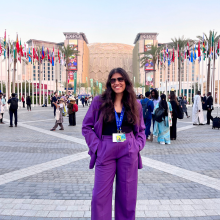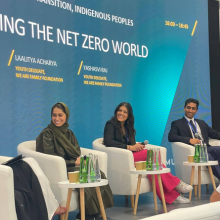In this essay, Laalitya Acharya, Founder of the Nereid Project and GCSE Delegate, reflects on her experience as a youth scientist and activist at COP28.
"Youth voices." "Phasing out fossil fuels." "Oil-based countries." All of these were phrases used to describe the 28th UNFCCC Conference of Parties (COP28). This momentous event, held in Dubai, U.A.E.'s Expo City, was supposed to mark the intersection of tradition and modernity. Here, in the middle of a climate conference that would be led by a C-level oil executive, activists from across the world gathered to push for quantifiable deliverables to end the global climate crisis.

As a 20-year-old from the United States, this was my first time attending a COP, and I was thrilled! I worked primarily in water advocacy, focusing on implementing science-based initiatives into the real world through policy, and wanted to see more action items on the list to help the world achieve Sustainable Development Goal (SDG) #6.
Similar to many youth activists, who had progressively become more and more disillusioned by the agreements at such global convenings, I wanted to see change at this COP. We wanted commitments to end fossil fuel dependencies, to hold the highest-emitting countries accountable, and to ensure that the youth voice was adequately represented.
I was definitely on the younger-side of COP delegates, and noticed that many events were not catered toward youth attendees. Conversations changed tone the second I introduced myself as a “student” rather than an executive or country official. In some spaces, there was even the sense that I should simply be grateful to be allowed into the room, and that there was no obligation for my ideas to be considered.
Simultaneously though, there was hope. Hope in the voices of many who seemed inspired to see so many young people in Dubai. Hope in our own voices to be present at COP28. And hope for the future, for a world where climate conferences are no longer necessary, where emissions are under control, and where the world has decided to always keep sustainability as its guiding principle.

But this COP also felt more personal than the others I had followed virtually over the years. Obviously, being on-the-ground meant that I was seeing decisions be made in real time. However, as a scientist, I felt that my place in the climate crisis was under fire. When the COP President stated that there is “no science” behind calls for a phase out of fossil fuels - at the same moment that young advocates were actively protesting to end fossil fuel dependencies - it created an eerie tone for the conference. While I was excited and enthralled with the energy at COP, I also began to consider the larger, systemic changes that are needed for global climate justice.
This is also why youth voices are so important: we are inheriting these systems, therefore it is essential that we have a say in how we build (and save) the planet. Youth advocates have creative and novel ideas for how we can stop the climate crisis, whether it is through “refreezing the arctic," providing more funding to climate education (and science education as a whole), and much more. We need mentorship and access to these spaces, which is why our presence at COP is even more critical.
I’d like to thank the Global Council for Science and the Environment for supporting me at COP with access to the Blue Zone. This allowed me to directly engage and be a part of the negotiations in real-time. Their support gave me, a youth advocate, the opportunity to make the impact that I had hoped to make while in Dubai. I hope that other institutions continue to follow in their footsteps to support young voices globally, both at and beyond COP28.
The opinions expressed in this essay are those of the author. They do not purport to reflect the opinions or views of the GCSE or its members.
Click here to learn more about GCSE's work and other events at COP28.